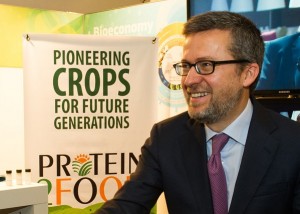The European Commission invited PROTEIN2FOOD to be part of the Bioeconomy Village at the info week on ‘Horizon 2020 Societal Challenge 2’, the biggest EU research and innovation programme. Aside from presentations and discussions with policy makers, the Bioeconomy Village displayed the work of 20 high-class EU-funded projects and initiatives relating to the bioeconomy.
Bioeconomy includes the production of renewable biological resources and the conversion of these resources and waste streams into value-added products, such as food, feed, bio-based products and bio-energy. The EU Bioeconomy Strategy paves the way to a more innovative, resource efficient and competitive society. Its aim is to provide food and nutrition security with the sustainable use of renewable resources, wh ile ensuring environmental protection.
ile ensuring environmental protection.
PROTEIN2FOOD, with its ambition to create innovative, high quality, protein-rich food crops as well as products, has an important role to play in supporting the EU to deliver on its Bioeconomy Strategy. Commissioner Moedas, joined by MEP Simona Bonafè came to the PROTEIN2FOOD stand to ask various questions about the objectives of the project and about the work already done.
Moreover, PROTEIN2FOOD received much interest from other policy makers, scientists and other visitors present at the event. They marvelled at the different showcased samples of seed groups (e.g. quinoa) or grain legumes (e.g. faba beans and lupins) and their protein-rich flours and isolates. PROTEIN2FOOD uses them for the development of innovative food products to replace animal protein. As an example, a prototype of protein-rich pasta, developed at University College Cork, was displayed.
All in all, the people’s great interest and positive feedback emphasised the importance of the project and plant-protein as part of the solution towards a sustainable Bioeconomy in Europe.
